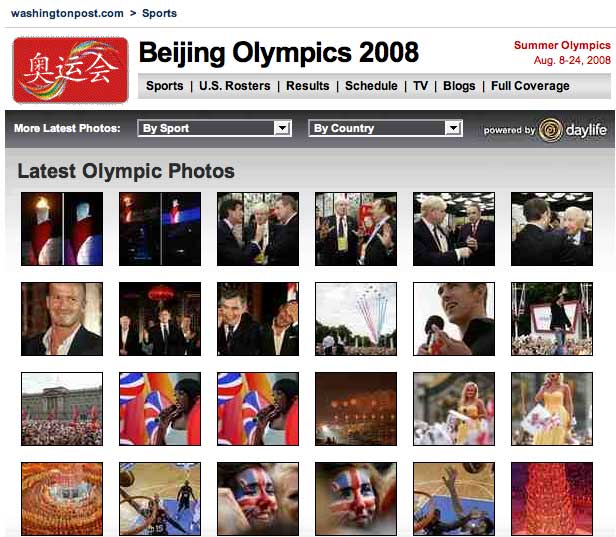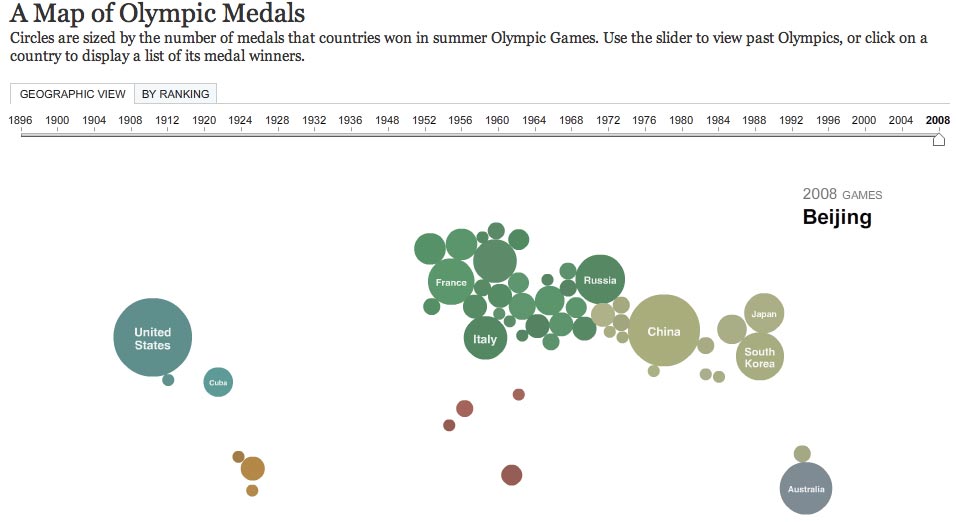Barack Obama’s election victory named top news story of 2008 in Associated Press’ annual poll, voted for by US editors and news directors.
Oil prices, the Beijing Olympics and Mumbai terror attacks all feature in the list.
Barack Obama’s election victory named top news story of 2008 in Associated Press’ annual poll, voted for by US editors and news directors.
Oil prices, the Beijing Olympics and Mumbai terror attacks all feature in the list.
The World Association of Newspapers (WAN) and the World Editors Forum have written to the Chinese government about international standards of press freedom in the country.
Laws in China restricting foreign journalists were temporarily relaxed during the Olympic Games in Beijing and have recently been extended by authorities.
In a letter dated October 21, WAN wrote to Chinese Premier Wen Jiabao in an attempt to change the laws permanently:
Your Excellency,
We are writing on behalf of the World Association of Newspapers and the World Editors Forum, which represent 18,000 publications in 102 countries, to welcome the extension of the relaxation in media regulations, but also to call on you to take further steps to uphold international standards of press freedom.
In the run-up to the Beijing Olympics, your government introduced new rules that allowed foreign journalists greater freedom to travel in the country without prior government permission and to talk to anyone who was willing to be interviewed. Those regulations were set to expire on 17 October, however, shortly before they expired new regulations were introduced that recognise these rights.
While welcoming the extension of the more relaxed regulations for foreign journalists, we are concerned that they do not extend to domestic journalists and that many fundamental rights necessary for the proper functioning of a free press are not observed. For example, there is no protection of news sources, it is not possible to report freely on Tibet and hotels are obliged to report the arrival of a foreign journalist to police. Furthermore, with more than 30 journalists and at least 50 cyber reporters imprisoned, China jails more journalists than any other.
We respectfully call on you to extend the relaxed regulations to domestic journalists, to introduce further reforms so that your country might fully respect international standards of press freedom, and to ensure that all
those detained for exercising their right to freedom of expression are immediately released from prison.We look forward to hearing from you at your earliest convenience.
Yours sincerely,
Gavin O’Reilly
President
World Association of NewspapersXavier Vidal-Folch
President
World Editors Forum
The software engineering company behind Sky News’ recent online revamp, Daylife, has launched a new product aimed at online news publishers.
Sky used Daylife’s products to create topic pages of related multimedia content called ‘in depth’ pages.
The new Daylife Enterprise API will similarly let publishers re-purpose blog posts, text, data and audio-visual content in new ways online.
How does it do this? The service will collect this content and then create feeds which the publisher can put to use a variety of ways – as per their request.
 For example – the Enterprise API was trialled by the Washington Post to create picture galleries from the Beijing Olympics – searchable by sport and country – and to accompany its US presidential campaign coverage.
For example – the Enterprise API was trialled by the Washington Post to create picture galleries from the Beijing Olympics – searchable by sport and country – and to accompany its US presidential campaign coverage.
Daylife took all the incoming photos from Post photographers around these subjects and made them available to the paper as an API, ready for use to create new pages on its website.
Utilising existing content in this way can be a success in terms of web traffic – making sites a more attractive prospect for advertisers, says Daylife CEO Upendra Shardanand.
As part of the product, publishers can make these content feeds open to the public and third-party developers – a feature which Shardanand hopes will lead to more collaboration on news content between publishers and users.
“In terms of e-commerce and advertising there’s been so much innovation in the last 10 years online, in comparison there’s not been so much in news,” he told Journalism.co.uk.
“How do you innovate if you don’t do software? I don’t know what the next best concept is but a service like ours can be shared.”
Publishers should not dismiss outsourcing this work, says Shardanand, after all it’s not their job and with the amount of content they have available would be extremely time consuming – the company has over 200 machines running to process the content. It’s not for free, but licences are decided on a customer-by-customer basis.
Instead, he told us, the aim is to get the most value out of the content that publishers are already producing for both online and other editions – such as the photos taken by WaPo staff – by doing the backend work for them.
Crucial to the success of the project will be the say that publishers have over what is done with their content – something which Shardanand is keenly aware of.
“These have to be content portals that are still customised and match your brand and voice,” he says.
“It wouldn’t work if the editors couldn’t do exactly what they want. Advertisers wouldn’t value it either.”
China is to end its relaxation of reporting restrictions in the country for foreign journalists, which were introduced in 2007 ahead of the Beijing Olympics.
It is not yet known what rules will replace the current guidelines, which will cease on October 17.
A new video player – courtesy of Perform and Virgin Media – is just the start for Sport magazine’s ‘nascent’ website, Greg Miall, managing director, told Journalism.co.uk.
Traditionally television’s domain, online sports video from other media sites is a growing trend. By working with a third party, however, rights to the content are handled by Virgin, which supplies Premier League football highlights, and Perform, which handles video of cricket, tennis, golf and rugby fixtures.
“It’s a different way to supply a latent audience demand for this kind of content,” said Miall, adding that the BBC’s recent online coverage of the Beijing Olympics was a benchmark for online sports video.
“What it did [the BBC’s Olympics site] was provide another way of viewing all this content and a lot more people ended up looking at content, which they might not look at usually.”
Improvements are lined up for the player and embedding it across the site’s other channels is also in the pipeline.
In addition, an online channel manager is set to join the magazine in the next few weeks and will bring in a series of changes to the site, Miall added.
The key thinking behind the video offering, he said, is to appeal to a generation of readers and viewers who aren’t watching television for prolonged periods or through a set anymore.
So is short-form, online sports video the freesheet equivalent of television?
The BBC Sport website had its ‘best ever day’ in terms of traffic on Monday 11 August with 4.4 million individual users, a blog post from Roger Mosey, director of BBC Sport, has said.
The traffic surge from the site’s Olympics coverage also saw more than 1 million users view live video streams on Friday 15.
The BBC’s iPlayer received 700,000 requests for Olympic programmes in the first week of the Games, Mosey said.
The competition – combined with the beginning of the Premiership – has also created record figures for mobile with more than 400,000 users accessing the BBC’s mobile services on Saturday – breaking the previous record of 270,000.
To report the Beijing Olympics online and on mobile the corporation has introduced six live video streams to its BBC Olympics website, an interactive map of the city and its sporting venues, an Olympics blog and expanded its mobile site to carry more video.
The coverage has also benefited from the decision to embed BBC video within pages rather than in a separate player.
The New York Times has created a great visualisation tool for the medals table from the Beijing Olympics.
Each country that has made it onto the podium is represented by a circle – its size relative to the number of medals won.
Clicking on the graphic gives an overview of how many gold, silver and bronze accolades have been won, with a fuller breakdown listed below the map.

Steve Parry, former Reuters sports editor, has died today aged 64, Reuters has reported.
Parry, who worked for the media group for 34 years, was sports editor from 1982 until his retirement in 2000.
He had been suffering from a respiratory illness and died in hospital.
Parry joined Reuters’ London sports desk in 1966 and was appointed sports news editor in 1977.
After leaving the group, he became a consultant for the International Olympic Committee.
His death comes on the eve of the Beijing Olympics – an event Parry had covered on the previous 10 occasions, attending his first Summer Games in Mexico City in 1968.
“We at Reuters are devastated by the news. Steve was one of the finest journalists Reuters ever had and one of the greatest men I ever knew,” said Paul Radford, Reuters current sports editor and Parry’s former deputy.
“He was one of the most revered and respected personalities in the world of sports journalism and a monumental figure in the Olympic movement.”
The International Federation of Journalists has teamed up with the non-profit Play the Game initiative to create an online resource for journalists covering the Beijing Olympics.
The Play the Game for Open Journalism site features: a list of reporters guides from industry groups such as Human Rights Watch; forums for journalists to discuss their experiences; and background information on Beijing.
The organisers will also be operating a helpline for journalists in China during the Olympics, who are facing pressure from authorities because of their work. The number for emergency assistance is + 32 475 76 13 92. To report
Journalists will be pampered with masseurs and world class dining, organisers have said.